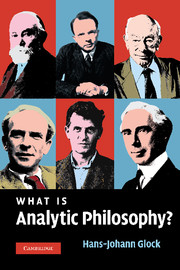9 - Present and future
Published online by Cambridge University Press: 05 June 2012
Summary
In the last chapter I argued that analytic philosophy is a historical tradition held together by ties of influence on the one hand, family resemblances on the other. This final chapter leaves behind the question of how analytic philosophy should be defined. The issue is no longer whether certain features hold true of all and only analytic philosophers. Instead it asks whether certain features have a special relevance for contemporary analytic philosophy and for its place in a wider cultural context, and how such features are to be assessed.
Section 1 deals with the role of the analytic/continental contrast in the high-profile culture and science wars epitomized by the Sokal hoax. I urge that one must distinguish ideologically motivated abuses of science from relativist-cum-constructivist views about knowledge. Combating the former may be a genuinely analytic cause, but the debate about relativism, constructivism and the correspondence theory of truth features analytic voices on both sides. The culture and science wars cast a positive light on analytic philosophy, at least in comparison to postmodernism. In section 2 I turn to the question of whether analytic philosophy has vices as well as virtues, once more with an emphasis on its current self-image and practice. I shall discuss, in this order, the charges that analytic philosophy suffers from scholasticism, isolation from other disciplines and the public, internal factionalism, and an exclusionary demeanour towards various outsiders. I shall exculpate analytic philosophy in some respects, while underwriting other complaints from both within and without.
- Type
- Chapter
- Information
- What is Analytic Philosophy? , pp. 231 - 261Publisher: Cambridge University PressPrint publication year: 2008



